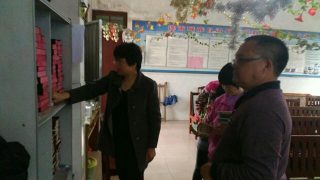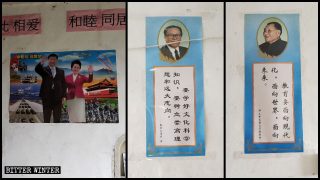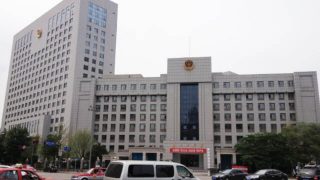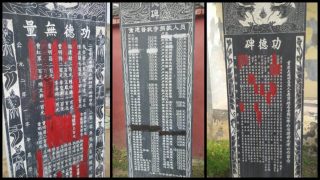Municipal governments are intensifying measures against foreigners and anyone with ties abroad suspected of using Christianity to “subvert the regime.”
Wang Anyang
CCP officials have long used the fear of foreign infiltration as a pretext to crack down on religious venues that are not approved by the government. In March, the chairman of the National Committee of the Three-Self Patriotic Movement, Xu Xiaohong, accused “anti-China Western forces” of attempting to influence “China’s social stability and even subvert our country’s political power through Christianity.”
The crackdown against “foreign infiltration” is intensifying. Bitter Winter obtained documents issued by city governments in different provinces, according to which, not only religious venues but also businesses, like hotels, colleges and universities with foreign ties and even individuals visiting China are ordered to be investigated.
The Plan for Jointly Investigating Religious Infiltration Activities, issued by a municipality in northeast China’s Jilin Province this April, foresees three stages of work, each lasting for a month, jointly carried out by several municipal departments, including the local United Front Work Department, Ethnic and Religious Affairs Bureau, Public Security Bureau, and the National Security Brigade.
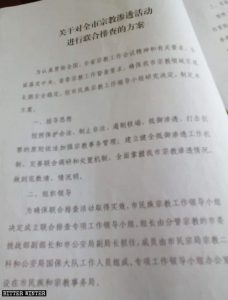
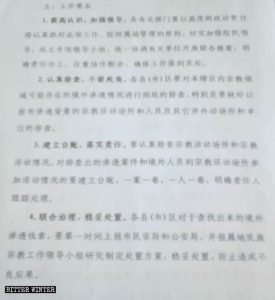
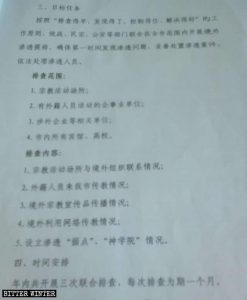
Religious meeting venues with foreign ties, their overseas contacts, foreign missionaries’ daily and online activities in China, the dissemination of religious materials, as well as activities of theological colleges, and other institutions are to be investigated. Files should be created for each identified case of suspected foreign infiltration as well as for every person involved in these activities and followed up regularly.
Meanwhile, the Plan for Carrying Out Special Crackdown on Important Issues in Christianity, issued by the Public Security Bureau of a locality in northern China’s Hebei Province, demands to intensify suppression against South Korea’s “Jiaxi Church,”(佳息教會) “Christian Presbyterian Church,” “Christian Bawo Church,”(基督教巴撾教會), “Lighthouse Church,” the US-based organizations “Campus Crusade for Christ” and “Youth with a Mission,” and other Christian groups.
Similar to the suppression in Jilin, Hebei authorities are also demanded to block “infiltration activities in China through trade and commerce, cultural exchanges, tourism, charity work, and other channels;” and, in particular, strictly prevent overseas Christian organizations and individuals from conducting missionary work at schools or businesses. According to the document, online foreign-related Christian information must also be blocked and deleted promptly.
At a meeting on religion held this April in Sanming city, in southeast China’s Fujian Province, officials emphasized the need to prevent religious infiltration by prohibiting believers from receiving information on foreign religions through radio, television and other means, because such promotion “is an attack on our country’s religious policies and human rights.” Possible paths of overseas religious influence should be blocked, including mailing and receiving foreign religious books and audiovisual materials. Foreigners who come to China for studying, charitable missions or just sightseeing or visiting friends and relatives should also be investigated and prevented from carrying out missionary work or establishing links with churches in China. Any financial or material assistance from foreign religious groups should be rejected because this “entices believers” and “interferes with normal religious activities.”
A South Korean pastor who currently resides in Beijing commented: “The CCP has a very tough attitude on the issue of Christianity. They have a long name list of South Korean religious persons in China and are also secretly investigating South Korean co-workers in the church. Some co-workers from South Korean have reported that they came to China on a tourist visa, but were stopped at the airport in Beijing.” His passport has also been seized for no reason, and he faces the threat of being deported at any time.
source:BITTER WINTER
